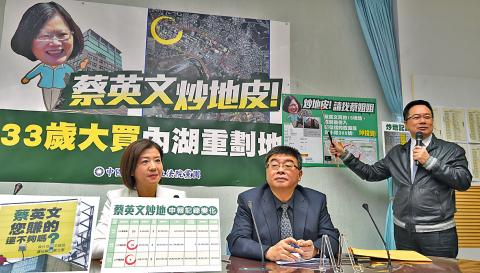The Chinese Nationalist Party (KMT) caucus yesterday accused Democratic Progressive Party (DPP) presidential candidate Tsai Ing-wen (蔡英文) of land speculation involving several properties in Taipei, in an apparent move to retaliate against the DPP for its recent pursuit of KMT vice presidential candidate Jennifer Wang (王如玄) over her military housing dealings.
Citing land registration transcripts, former KMT legislator Chiu Yi (邱毅) told a news conference at the legislature in Taipei that Tsai had purchased 15 plots of land totaling 271 ping (894.3m2) in the city’s Neihu District (內湖) on April. 15, 1988.
“The acquisition occurred when Tsai was merely 33 years old and had only served as an associate professor at National Chengchi University’s Department of Law for three years. A few months later, in August of the same year, the Taipei City Government included the land Tsai bought in a redevelopment zone and imposed a ban on construction and property sales,” Chiu said. “I must praise Tsai for her remarkable foresight as a land speculator.”

Photo: Liu Hsin-de, Taipei Times
Nine years later, Tsai’s plots were sold in their entirety, Chiu said, adding that they were later combined into a single plot on which Farglory Land Development Co chairman Chao Teng-hsiung (趙藤雄) constructed the Heidelberg Technology Center in 1999.
The former KMT lawmaker said that over the course of those nine years, the publicly announced land value increased by almost 13 times, from NT$24,000 (US$726.94) per ping in 1988 to NT$264,000 per ping in 1997.
“However, if the calculation is based on the land’s actual market value, it is estimated that Tsai reaped a profit of at least NT$180 million from the sales of the properties,” Chiu said, urging the DPP chairperson to explain to the public her exact profit from the transactions.
KMT Legislator Alex Tsai (蔡正元) said he has a good grasp of the real-estate market in Neihu as he has served as a public representative in that district.
“Land inside Taipei’s redevelopment zones were hot spots of speculative land transactions, especially those in Neihu. Individuals who were able to purchase or sell land in the zones were definitely not ordinary people. They were the best of the best land speculators at the time,” Alex Tsai said.
He said that he is impressed by how the DPP chairperson managed to muscle in on Neihu’s hotly contested land speculation market at such a young age and acquired information on when the ban on the sales of the land she purchased would be imposed.
“I think Tsai Ing-wen can scrap her campaign policy of building social housing units to address housing unaffordability in the nation. She can simply share her secrets of successful land speculation with young people,” he said.
KMT caucus deputy whip Alicia Wang (王育敏) said the the KMT is simply subjecting Tsai Ing-wen to the same scope of public scrutiny as the one Jennifer Wang has undergone due to her controversial sales of several government-subsidized military dependents’ apartments.

ENDEAVOR MANTA: The ship is programmed to automatically return to its designated home port and would self-destruct if seized by another party The Endeavor Manta, Taiwan’s first military-specification uncrewed surface vehicle (USV) tailor-made to operate in the Taiwan Strait in a bid to bolster the nation’s asymmetric combat capabilities made its first appearance at Kaohsiung’s Singda Harbor yesterday. Taking inspiration from Ukraine’s navy, which is using USVs to force Russia’s Black Sea fleet to take shelter within its own ports, CSBC Taiwan (台灣國際造船) established a research and development unit on USVs last year, CSBC chairman Huang Cheng-hung (黃正弘) said. With the exception of the satellite guidance system and the outboard motors — which were purchased from foreign companies that were not affiliated with Chinese-funded

PERMIT REVOKED: The influencer at a news conference said the National Immigration Agency was infringing on human rights and persecuting Chinese spouses Chinese influencer “Yaya in Taiwan” (亞亞在台灣) yesterday evening voluntarily left Taiwan, despite saying yesterday morning that she had “no intention” of leaving after her residence permit was revoked over her comments on Taiwan being “unified” with China by military force. The Ministry of the Interior yesterday had said that it could forcibly deport the influencer at midnight, but was considering taking a more flexible approach and beginning procedures this morning. The influencer, whose given name is Liu Zhenya (劉振亞), departed on a 8:45pm flight from Taipei International Airport (Songshan airport) to Fuzhou, China. Liu held a news conference at the airport at 7pm,

Taiwan was ranked the fourth-safest country in the world with a score of 82.9, trailing only Andorra, the United Arab Emirates and Qatar in Numbeo’s Safety Index by Country report. Taiwan’s score improved by 0.1 points compared with last year’s mid-year report, which had Taiwan fourth with a score of 82.8. However, both scores were lower than in last year’s first review, when Taiwan scored 83.3, and are a long way from when Taiwan was named the second-safest country in the world in 2021, scoring 84.8. Taiwan ranked higher than Singapore in ninth with a score of 77.4 and Japan in 10th with

GRIDLOCK: The National Fire Agency’s Special Search and Rescue team is on standby to travel to the countries to help out with the rescue effort A powerful earthquake rocked Myanmar and neighboring Thailand yesterday, killing at least three people in Bangkok and burying dozens when a high-rise building under construction collapsed. Footage shared on social media from Myanmar’s second-largest city showed widespread destruction, raising fears that many were trapped under the rubble or killed. The magnitude 7.7 earthquake, with an epicenter near Mandalay in Myanmar, struck at midday and was followed by a strong magnitude 6.4 aftershock. The extent of death, injury and destruction — especially in Myanmar, which is embroiled in a civil war and where information is tightly controlled at the best of times —